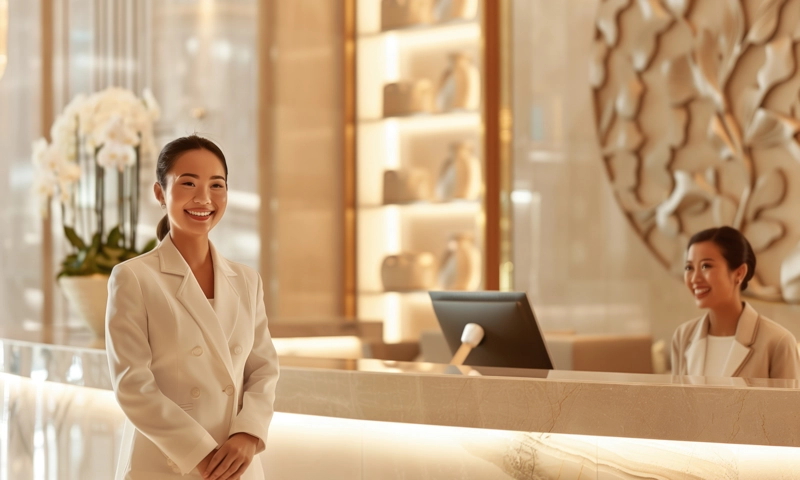In the world of competitive luxury retail, exceptional service can make a brand standout. It is not only about selling products, or even creating a memorable brand experience. It’s about elevating every customer’s journey in the world of your brand. Adopting a mindset of hospitality offers many advantages.
For one, it facilitates brand immersion, transforming your brand into a lifestyle rather than just a logo on products. For luxury brands in high demand, hospitality is a new way to touch clients’ lives without diluting the exclusivity of their products.
Outstanding service and hospitality can also turn a disappointing experience – such as the desired product not being available – into a memorable one, with “little” effort. This mindset fosters deeper connections with customers, enabling you to learn more about their preferences and build lasting relationships.
According to our research, creating a luxury brand through hospitality usually involves four main steps:
- Instil a culture of hospitality in your entire organization.
- Your employees will be more likely to embrace this attitude if you train, guide and support them.
- Link hospitality to other processes and functions (such as sales, for example) to help support them. Hospitality should not be an end in itself.
- Find your differentiator within the sector – how can you stand out?
This article will examine in detail each step that can help luxury brands to achieve success through hospitality.
Instilling a Hospitality Mindset
What is the hospitality mindset exactly?
The true essence of hospitality is to create an environment that fosters respect, genuine care and attention. Every interaction should leave a lasting impression.
The following are some of the ways to improve your own ability to learn. luxury brandsEmployees must actively engage with this mindset emotional labor—the practice of managing one’s emotions to maintain a positive and welcoming demeanor as part of their role, essential for emotional resilience.
In luxury retail, it is important to be able to understand the emotions and needs of customers. Employees trained to observe emotional and behavioral cues can significantly enhance customer satisfaction and perceived luxury (Hoffman & Bateson, 2024).
Retail staff often overlook CRM data. A perceptive employee can make use of it. If a customer appears unsure, they can suggest better alternatives. They can also find new opportunities to cross or upsell. They can also bond with clients over shared interests to create a lasting relationship.
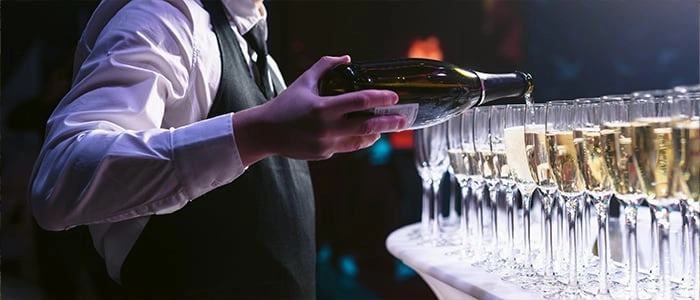
LVMH’s training programs This is exemplified by the way in which they interact with their clients. Their customer-facing teams combine their technical knowledge with perceptive interactivity techniques, empowering them to create meaningful and tailored interactions. This creates a sense of comfort and trust, which fosters stronger emotional connections between the client and the company.
Louis Vuitton’s client advisors are known to be friendly and enjoy a drink with their clients. The CRM should be used by employees to understand their customers.
Encourage them to tell stories about their brands, products and even more personal ones, while providing refreshments. This creates an intimate atmosphere, which reinforces a genuine sense of belonging.
It is possible to learn and practice a hospitality mindset. Luxury service personnel might not initially see its value but it promotes an encouraging work environment. It promotes real human connections, builds loyalties, and creates memorable and emotional experiences. This attitude enforces respect towards both customers and team members.
Train your team for a branded luxury retail service
How can brands best encourage a hospitality mentality?
Client advisors often have good intentions but may lack confidence in executing even the most basic gestures. Client advisors often lack formal training, whether it’s on “what constitutes appropriate eye contact,” how to greet clients or serve champagne. Some may rely too heavily on the occasional feedback of more experienced colleagues in order to confirm that “what they’re doing is OK!”
Develop a branded luxury hospitality service It goes beyond product knowledge. The value of luxury is emphasized by continuous professional development, which empowers employees to provide not only memorable but also emotionally engaging and empathetic interactions that deepen customer loyalty.
A holistic approach incorporating hard and soft skills is vital, as luxury customers expect expertise combined with a tailored experience (Dion & Borraz, 2017). Personalizing every detail The service experience increases customer satisfaction, and brand loyalty is strengthened.
Strong examples of integrated and in-depth hospitality training programs specifically designed for retail staff, can be seen at luxury brands, Cartier and Caviar House & Prunier. Whilst Cartier is mainly focused on the luxury watches & jewelry, and Caviar House & Prunier is in luxury F&B, both luxury brands have dedicated resources to encourage their associates to go through curated sessions on luxury service etiquette.
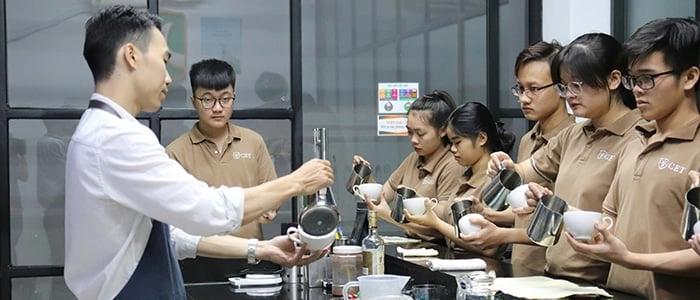
The training includes role-playing and workshops. From initiating eye contact to welcoming clients with warmth, professionalism and warmth, the scenarios are based on. Employees are even trained on how to elevate moments like in 5* hotels, such as serving a glass of high-end champagne, to create an atmosphere of sophistication and exclusivity. These exercises allow employees to gain confidence and improve their emotional labor. They can better anticipate the needs of customers, control their emotions and read subtle cues in a room.
Luxury retail brands must focus on a shift in organizational culture towards hospitality, beyond the implementation and promotion of hospitality programs. By empowering client-facing teams with training, guidance, and assistance beyond basic service protocols, such as anticipation techniques, verbal, and non-verbal communications, and topics like verbal, and non-verbal, communication, management is able to empower them.
Reconnect hospitality with the customer journey
Is it possible to boost your key performance indicators by rolling out the “red carpet” for customers?
Integrating hospitality within luxury retail environments enhances not only customer service functions but also brand functions like CRM, storytelling, and brand positioning. experiential marketing.
Luxury brands can adopt a hospitality-first strategy to create environments that are more focused on personalized and anticipatory services, mirroring five-star hotels’ attention to details.
This mindset transforms the retail space into an experience-driven destination—one where sales are no longer purely transactional but relational, fostering emotional connections that encourage higher spending.
As an example Louis Vuitton (LV) has woven hospitality into its retail concept Private salons and client-only events. In flagship stores like the LV Maison on Champs-Élysées, VICs (Very Important Clients) are welcomed into private apartments, where personal stylists offer tailored consultations over curated F&B menus.
LV hosts frequent events in locations like Venice and St.-Tropez. These events give VICs a unique opportunity to experience the brand through travel and lifestyle elements.
The ultra-personalized hospitality-driven service encourages exclusivity, deepens client relationships and often leads to higher-value purchases.
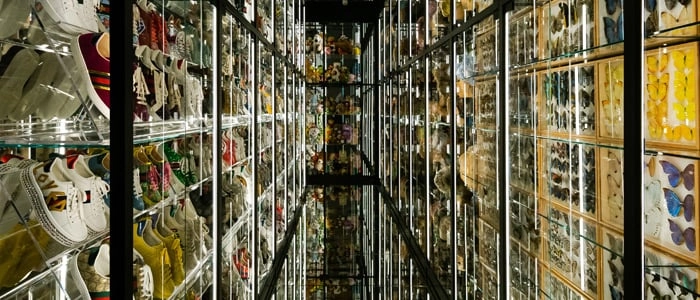
The same is true at the Gucci Garden in FlorenceGucci’s multifaceted hospitality includes the Michelin starred Gucci Osteria da Massimo Bottura. The Gucci Garden, located in the historic Palazzo della Mercanzia in Milan, combines fashion with art and cuisine to immerse visitors in the world of the brand and encourage deeper engagement. By offering a multisensory hospitality, sales advisors are able to build lasting relationships with customers, in an authentic environment that is true to the history and heritage of the brand.
Ultimately, luxury retailers who embrace hospitality, elevate every stage of the customer journey—before, during, and after purchase. This hospitality first approach helps to increase customer engagement and sales, as well as to improve customer loyalty.
Luxury brands can increase dwell time and conversion rates by offering highly personalized services in experiential spaces and encouraging emotional engagement.
Find Your Differentiator
What can brands do to stand out if they all serve coffee?
Luxury retail brands use unique servicescapes elements like ambiance, sensory cues and spatial design, to enhance their customer’s experience. They can make hospitality an intrinsic part of the brand identity. Lighting, seating arrangements and signature scents, all carefully curated, can instantly differentiate a brand.
For these efforts to yield tangible returns, it is important that every hospitality interaction be tracked in the brand CRM system. In the future, this allows for even more tailored experiences and coherence, making sure that customers are seen, appreciated, and remembered at every interaction. In today’s highly competitive luxury landscape, brands that do not use data-driven personalized experiences will lose out.
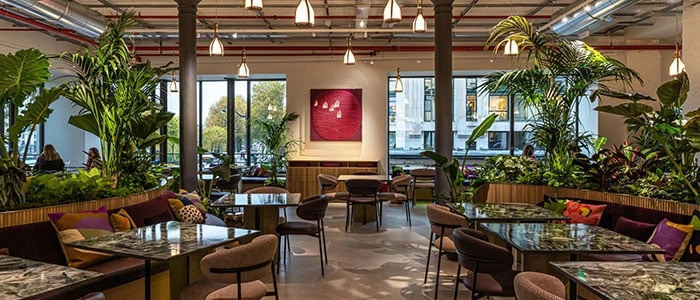
Louis Vuitton, for instance, has creatively integrated a branded café and chocolaterie experience at its Paris installation at the Pont Neuf, above their LV Dream exhibition.
Cheval Blanc’s pastry chef creates exclusive chocolates for customers. Maxime Frédéric, in a café The interiors are adorned with art installations and custom seating, creating an immersive experience for clients that reflects the Louis Vuitton philosophy. This approach is part Louis Vuitton’s broader strategy of blending retail with lifestyle, to strengthen brand loyalties.
Similarly, Jaeger-LeCoultre’s Reverso 1931 Café This brand leverages the Art Deco environment in order to connect with its heritage. Guests are taken on a historical journey while focusing on luxury and craftsmanship.
This servicescape transforms customer interaction into meaningful experiences that go beyond the traditional welcome or sales ceremony.
By combining servicescape elements and a CRM strategy that is well integrated, you can achieve a powerful differentiation formula through hospitality.
A meticulously designed retail space—featuring bespoke furnishings, curated music, and personalized services—immerses customers in a brand’s world, while a robust CRM ensures these sensory-driven experiences are tailored to individual preferences.
Brands can achieve seamless, emotional resonance through both elements, which not only enhances customer satisfaction, but also strengthens long-term loyalty. This sets them apart from the competition in the luxury market.
Strategic Investment
In conclusion, developing a branded luxury service through hospitality is not only about enhancing the customer experience into something “memorable”—it’s a strategic investment in the brand’s long-term success.
Luxury brands can welcome their clients to their world by adopting a hospitality mentality, guiding and training employees to provide exceptional service, integrating the hospitality journey into other functions and finding unique differentiations. This will transcend traditional retail experiences and in-store services.
To sustain these efforts, it is important to use customer data efficiently. To improve future customer experiences, personalize individual offers, and create lasting client relationships, it is crucial to record every hospitality experience in the brand’s CRM system.
In an increasingly competitive luxury market where the competition is fiercer, this shift to a hospitality mentality, based on data-driven personalized practices, will be the keystone in retaining customers and maintaining the brand’s position.

Tamara Tovisi, International Master of Luxury Management. Connect with Tamara via LinkedIn.
This article was originally published on EHL Insights.


